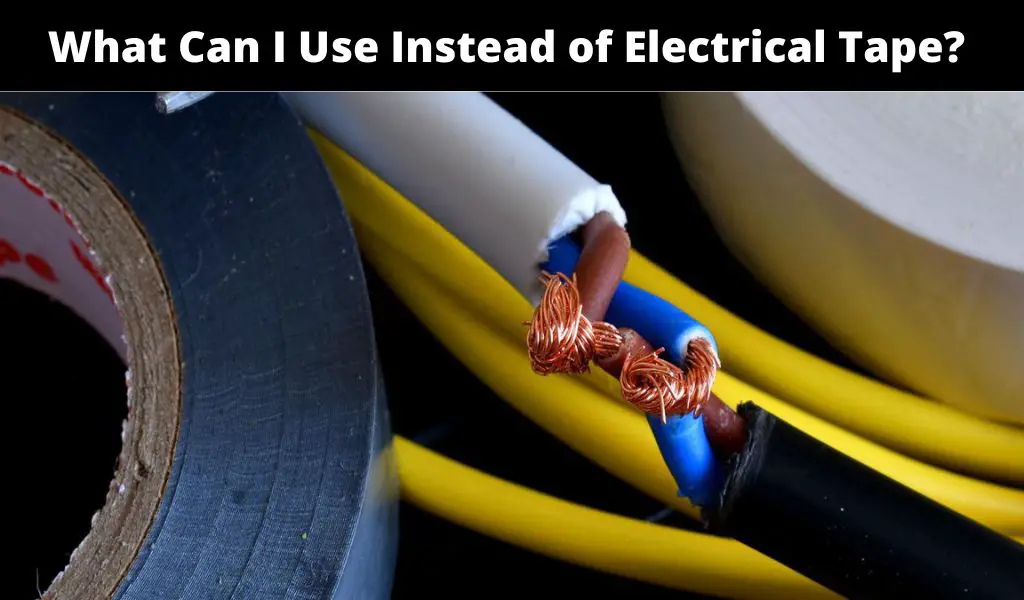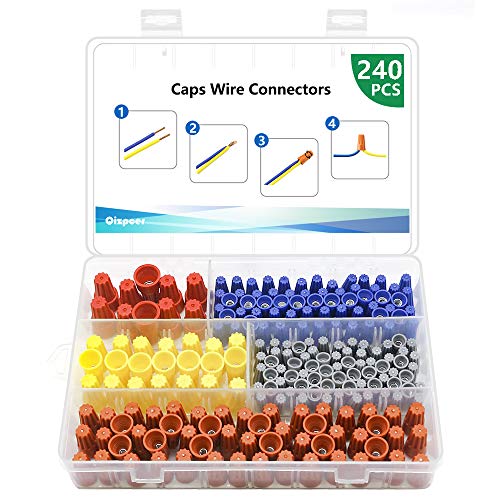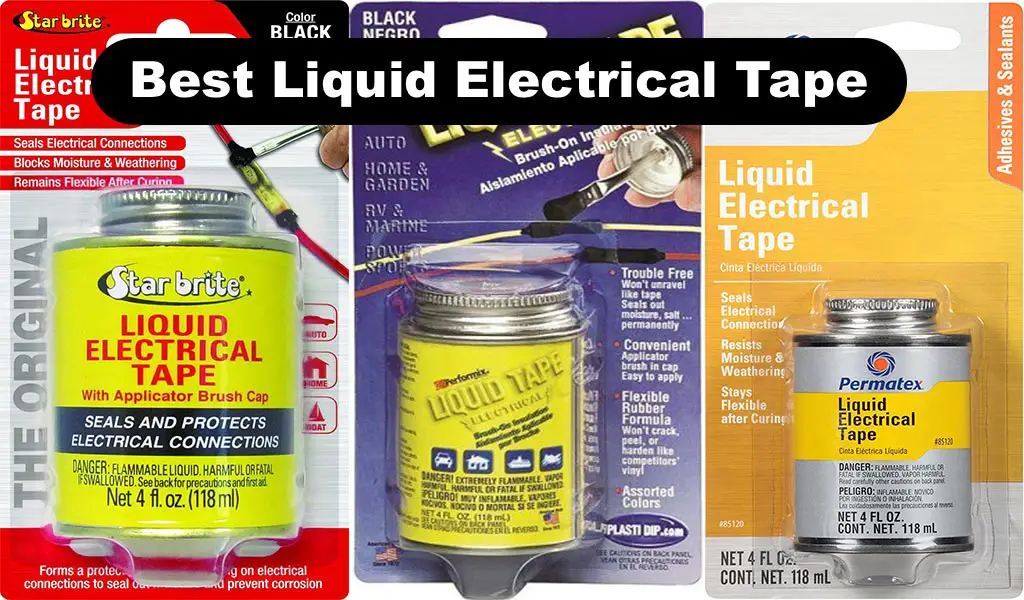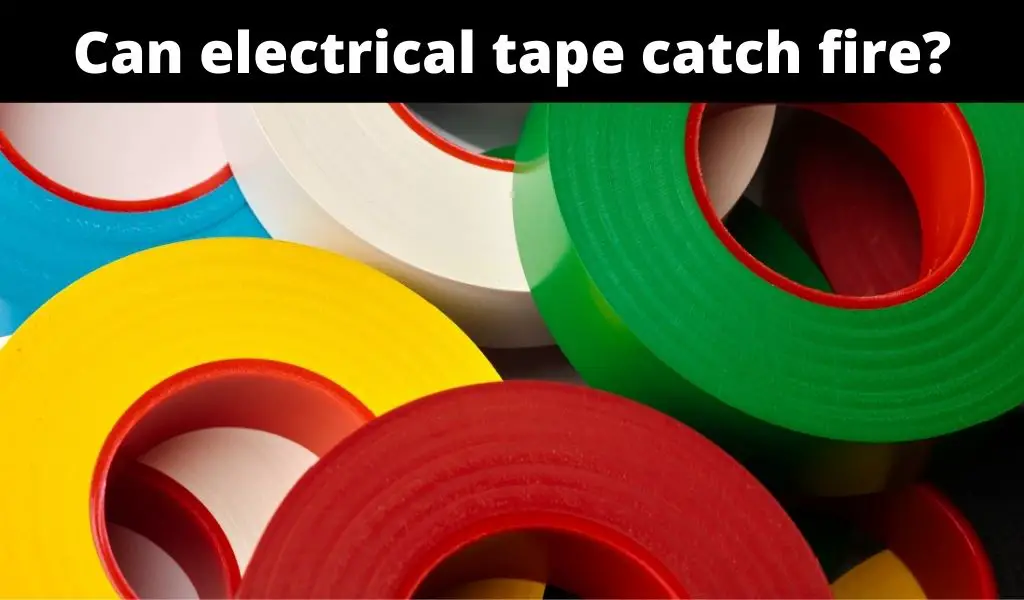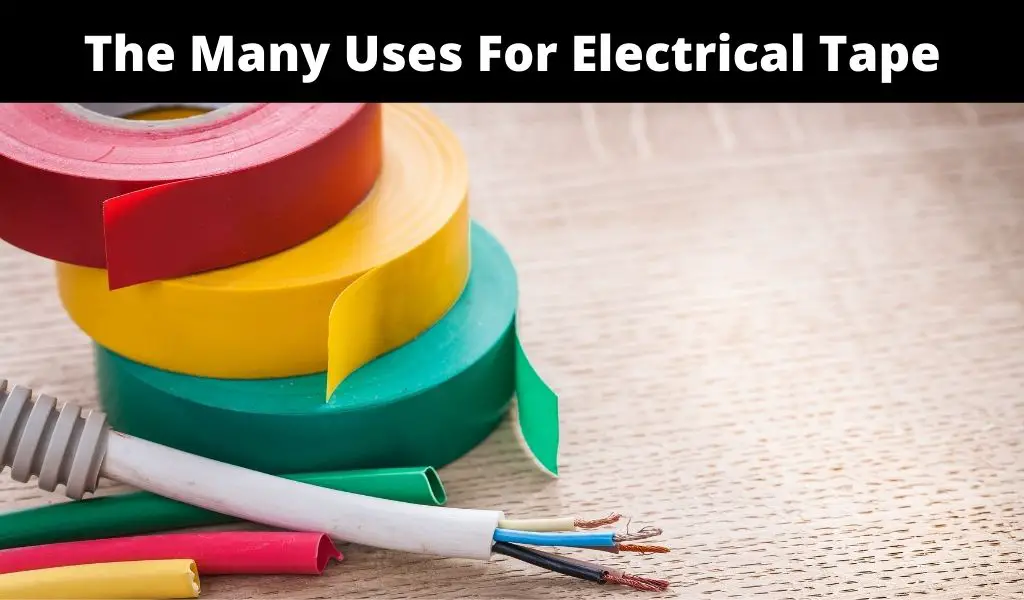To answer the question What Can I Use Instead of Electrical Tape, it’s important to define electrical tape. Electrical tape is specialized tape meant for insulating, protecting, and shielding wires, cables, and other components that conduct electricity.
Electrical tape (or thermal insulation/insulating tape) has widespread applications in professional and domestic settings. The tape also varies in length and size based on application. Electrical tape also comes in different colors and materials to guarantee optimal insulation characteristics as well as offer precise color coding for different wires and cables.
Understanding the unique characteristics of electrical tape is important to be able to know what can be used to replace electrical tape. Let’s take a look at the properties of electrical tape.
Properties of Electrical Tape
Electrical tape can be described as stretchy and elastic. It can be applied easily and tightly around wires or components. However, the tape isn’t waterproof. It’s a challenge coming up with waterproof electrical tape since the tape main’s job is to hold adhesive. If the tape is waterproof, the adhesive is bound to lose effectiveness when wet. The seal may also fail under pressure.
To solve this problem, electrical tape is designed with special water/weather resistance. While electrical tape will work with some moisture, it will typically fail when exposed to large amounts of water.
The importance of keeping wires and components held together by electrical tape away from water can’t, therefore, be overemphasized. Besides failing, water and electricity can result in serious risks. In a nutshell, electrical tape can repel water, however, it isn’t waterproof, meaning it will be susceptible to large amounts of water.
What Can I Use Instead of Electrical Tape? (Electrical Tape Alternatives)
Having understood what electrical tape is, the types, and the properties, it should be easier to understand what may be an ideal replacement or alternative. There are several alternatives to consider, with the most common solutions discussed below;
I. Wire Nuts
Prices pulled from the Amazon Product Advertising API on:
Product prices and availability are accurate as of the date/time indicated and are subject to change. Any price and availability information displayed on [relevant Amazon Site(s), as applicable] at the time of purchase will apply to the purchase of this product.
Wire nuts can work like electrical tape. They resemble plastic insulated caps featuring threading in the inner part. Wire nuts (also known as wire connectors) cover the ends of stripped wires. They crimp together, connecting two wires. Wire nuts are safe and effective insulating tape alternatives.
II. Shrink Tubing
Prices pulled from the Amazon Product Advertising API on:
Product prices and availability are accurate as of the date/time indicated and are subject to change. Any price and availability information displayed on [relevant Amazon Site(s), as applicable] at the time of purchase will apply to the purchase of this product.
You can also use shrink tubing instead of electrical tape. The tube is made of plastic surrounding two wires. When heated, it shrinks to hold wires or components together.
III. Masking Tape
Prices pulled from the Amazon Product Advertising API on:
Product prices and availability are accurate as of the date/time indicated and are subject to change. Any price and availability information displayed on [relevant Amazon Site(s), as applicable] at the time of purchase will apply to the purchase of this product.
Can masking tape replace electrical tape? No. Masking tape should not be used to replace electrical tape since it isn’t rated for electrical applications. It is potentially flammable and can also allow electricity to pass through it which would introduce electrocution and shock risks.
While other tapes can be used, UL-listed tapes are the best alternatives when connecting wires or components that conduct electricity.
IV. Scotch Tape
Prices pulled from the Amazon Product Advertising API on:
Product prices and availability are accurate as of the date/time indicated and are subject to change. Any price and availability information displayed on [relevant Amazon Site(s), as applicable] at the time of purchase will apply to the purchase of this product.
Can scotch tape replace electrical tape? No. Scotch tape should not be used for electrical applications such as connecting live wires. Scotch tape does not have electrical insulation properties and can catch fire easily. Furthermore, the tape isn’t flexible. As mentioned, UL-listed tapes are the best electrical tapes to use when connecting electrical wires or components
FAQs About Electrical Tape and Electrical Tape Alternatives
1. Can You Use Other Adhesive Tapes Instead of Electrical Tape?
While you can use many tapes instead of electrical tape, other adhesive tapes aren’t recommended as electrical tape substitutes, especially when the tape is directly contacting circuitry or wiring.
This is due to the fact that such tapes aren’t specifically designed for electrical applications. They lack sufficient insulation and thermal properties critical for electrical applications. In a nutshell, other adhesive tapes may work. However, they are unsafe.
2. Can Duct tape be Used Instead of Electrical/Insulation Tape?
In electrical circuitry applications, it is important to understand the differences between duct tape and electrical tape. First and foremost, duct tape is a pressure-sensitive, sticky tape made from cloth backing and coated with polyethylene or other flexible plastic.
The tape features a superior adhesive layer with unmatched adherence to many materials. Duct tape also has a reasonable degree of moisture resistance, even if it isn’t waterproof.
While duct tape can protect exposed wires to a certain degree, it doesn’t qualify as electrically insulating material. In simple terms, current can penetrate the tape and pose some risks.
The tape is flammable, making it unsuitable for electrical applications. Electrical tape is also more durable than duct tape. The tape degrades quickly in severe conditions when compared to specialist electrical tapes made of PVC or stretchy vinyl.
Duct tape will also shift due to changing environments. Electrical insulation tape performs way better than duct tape in the long run. While duct tape can be a temporary solution, it comes with serious risks when adverse weather, moisture, and chemical corrosion are probable occurrences.
3. Can Insulating Tape Cause Fire?
While electrical tape is designed to cope with electrical risks, if the electrical component or wires become too hot, they can ignite and burn the tape. However, this is highly unlikely in most scenarios since the electrical tape has great thermal properties.
The tape is designed to handle high temperatures. If installed correctly as directed and in the right environment, fire risks are reduced significantly.
4. Can Electrical Tape Insulate Wires?
The main role of electrical tape is insulating and protecting electrical wires and components. Contrary to popular belief, twisting the stripped wires together and installing electrical tape isn’t the best way to insulate wires. Although common, this method doesn’t follow the strict safety standards demanded in many applications.
In some cases, wire connectors may be required for full compliance. It is therefore critical to check the required guidelines or procedures first.
If such tapes are subjected to high voltage or current and/or other environmental conditions, they are bound to conduct current and cause serious harm.
Most importantly, even electrical tape that doesn’t meet the required specification may be unsafe for some applications. The importance of adhering to requirements and shutting down circuitry completely before commencing repairs involving already-installed tape can’t be overlooked.
5. How Do I Use Electrical Tape Correctly?
Generally, electrical tape is commonly used for minor DIY tasks like joining small cables and other minor electrical repairs. However, it isn’t advisable to use the tape to do major repairs on highly damaged cables.
What’s more, you should look for a more specialized solution when repairing or making long-lasting connections. Electrical tape shouldn’t be used for connecting wiring outlets, light switches, and junction boxes in the long term.
It’s also advisable to use electrical tape alongside wire nuts as well as similar connectors to ensure a safer and more secure solution. Insulating tape shouldn’t be used alone to repair damaged cables anywhere, especially those adjacent to flammable materials or soft furnishings.
6. Is Electrical Tape a Conductor?
Electrical tape works as an insulator. However, it must be installed properly. As an insulator, it protects people and electrical components from electric current flowing through the cables. When the right type of tape is used and installed properly, it shouldn’t conduct electricity.
7. What is Electrical/Insulating Tape Made Of?
For electrical tape to work correctly, it must be made using the right materials. The best tape featuring the best materials acts as a great insulator against electricity. It also protects circuitry and users.
It also features heat-resistant materials that are fireproof to a certain extent (based on the application in question). The tape is flexible and easy to use for a wide range of circuits, wires, and connections. The most common electrical tape material is vinyl, but there are many alternative materials today.
8. How Many Types of Electrical Tape are There?
Electrical tape is available in many varieties. Before you consider alternatives, explore the variety of tapes you can use. As mentioned above, the tape can vary based on color, materials, size, etc. Electrical tape is usually categorized based on color, backing material, and thickness. The most common types include;
PTFE Electrical Tape
Polytetrafluoroethylene tape or PTFE tape is a synthetic fluoropolymer tape that is popular for its superior chemical resistance. The tape (also known as Teflon tape) is inert in the highest temperatures (below 300 degrees Celsius), offering great thermal stability. The tape also has great dielectric properties (doesn’t conduct electricity when in contact).
Polyvinyl Chloride Electrical Tape
PVC tape is among the several plastic electrical tapes available today. It is commonly used for applications corresponding to those standard vinyl tapes. However, the tape is perfect for low-temperature applications. PVC electrical tape is great for adverse weather applications. It also handles abrasion and metal corrosion well.
Mastic Electrical Tape
This tape features the same adhesive used in tiling and decorating. Mastic tape is malleable with a rubberized backing that offers great dielectric properties. The tape is popular for applications in moist environments, given its high-degree moisture resistance.
Mastic tape is flexible and stretchy, making it perfect for padding and wrapping sharp electrical components or connections.
Vinyl Electrical Tape
This electrical tape happens to be the most popular globally. It is common in standard wiring applications like insulation and repair. The tape is highly versatile, considering vinyl offers a perfect mix of durability, functionality, and protection. Vinyl electrical tape will offer decent protection from chemicals, abrasion, moisture, chemicals, and variable temperature.
Cloth Electrical Tape
This tape doesn’t have strong dielectric properties, so it isn’t the best for insulation applications. However, it has great mechanical properties. The tape is incredibly flexible and strong, making it great for repairs and fixes. It is commonly used alongside other materials to boost conductive resistance and high-temperature performance.
Rubber Electrical Tape
Rubber tape works for many applications. Vulcanized rubber is great for cable jacketing and conducting repairs in rugged environments like construction sites and industrial manufacturing plants. Rubber electrical tape is very durable. Some types of rubber tapes are used for their dielectric properties.
For instance, those made from ethylene-propylene are used in high to medium-voltage applications. However, the general-purpose application for rubber electrical tape is low voltage applications, moisture sealing, and padding.
Polyester Electrical Tape
This electrical tape stands out for being thin and durable. It has tough resistance to tears, puncturing, and abrasion on the edges. The tape is resistant to moisture, solvent, and chemicals. Polyester electrical tape can also resist extreme heat. The tape comes with various adhesive backings ranging from thermosetting to acrylic rubber.
Liquid Electrical Tape
This tape can qualify as a product with similar applications to typical electrical insulation tape. It is simply a synthetic rubber-based liquid applied to coat electrical parts/components. The tape offers resistance from abrasion, moisture, UV light, and some chemicals.
The tape also has strong dielectric properties. Liquid electrical tape is common in manufacturing, where it is used to color-code wires, and insulate or protect cables/connections.
Silicone Rubber Tape
This electrical tape is made of silicone which makes it pliable and soft. The tape has a variety of operating temperatures (-80 to 200 degrees Celsius). The tape also has superior dielectric properties.
Silicone rubber tape won’t react with chemicals making it great for exposure to harsh weather, radiation, ozone, UV, moisture, etc. The tape is perfect for wrapping around tight spaces and awkward shapes. However, silicon electric rubber tape will be affected by puncturing and abrasion.
Cambric Electrical Tape
The tape is composed of cotton fabric. It is coated in insulating vanish before being applied. Cambric electrical tape is mechanically abrasive, tough, and resistant to puncture. These properties make the tape perfect for protective applications and repairs.
On application, the tape creates a durable and robust wrap that can be removed cleanly in the future during repair or maintenance.
Glass-Cloth Electrical Tape
This tape is made from polyester film and glass fiber strands. The tape has a high thermal resistance. It is designed to cope with extreme temperatures up to 200 degrees Celsius. It is also tough and offers excellent durability on the edges.

